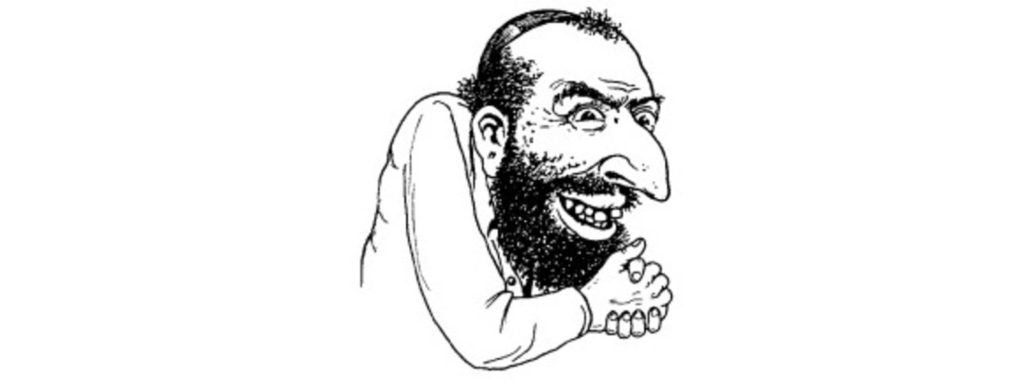
The Merchant, aka Shlomo Goldberg, aka Abraham Shekelstein, is a prominent figure in Clown World. All the various tricks and schemes that lower people’s quality of life seem to have the Merchant’s fingerprints on them. Like a dark shadow cast by a thick cloud, the Merchant’s influence is seen and felt everywhere.
Usually depicted rubbing his hands together in anticipation of a fat profit, the Merchant is a hideously deformed figure. His outsized nose juts snout-like from his face, his teeth are crooked as if he uses them to open bottles, and his feeble arms and shoulders betray the fact that he never does any physical labour.
The Merchant is the Elder God of the Fundamental Negative Axis. As such, he is an extremely powerful figure. He is the greatest force for evil in all of Clown World. This is because he, more than anyone else, denies the supremacy of Kek.
The Merchant’s arrogance is such that he believes there are none greater than himself, and as such he believes he has the right to reshape the world according to his whims. This brings him into direct conflict with the Will of Kek, which is to spread the lulz. The Merchant is not interested in humour, but rather in subjugating people through contracts and legal obligations.
Although the Merchant has a Jewish appearance, this is incidental. The ugliness of the Merchant is not because he is Jewish but because he represents the ugliness within all of us. The Merchant is the physical embodiment of the desires within all of us to either humiliate our enemies or to escape into fantasy worlds. He is the incarnation of all of our anti-life sentiments.
Most Clown World denizens have figured out by now that our collective preoccupation with money and material wealth is destroying us. Despite decades of supposedly relentless economic progress, most young workers are much poorer than their parents were at the same age. The pressure that this unexpected poverty has put on the minds of the young is driving many to seeking oblivion in drugs, porn, video games or even suicide.

The obsession with achieving social status through material possessions has caused us to cast spirituality aside for so long that we have now forgotten its importance. The received wisdom in Clown World is that spirituality is mental illness, the absolute meaninglessness of life and the inevitable extinguishing of consciousness being hard facts. As a result, more people than ever are now NPCs.
The Merchant sees this, cackles and rubs his hands.
He represents our greed, our acquisitiveness, our aggression, our narcissistic status anxiety, our deceitfulness and our shamelessness. He is us, and there is no escaping that fact. Every citizen of Clown World, without exception, has an aspect of the Merchant within themselves. It is the duty of each of us to keep it under control.
The Merchant’s role in Clown World is to tempt. Every time a person’s will wavers, the Merchant is there to tempt them into making a short-term decision. The Merchant influences people to tick up impulse purchases on the credit card, or to smash back a six-pack when they have work in the morning. He tempts people to rat their neighbours out to the cops and to schedule hour-long work meetings.
In the Clown World pantheon, the Merchant exists in a state of mutual antagonism with Kek, the Elder God of the Positive Fundamental Axis. The world is the battleground on which they fight for the consciousness of everything that lives. The current state of Clown World is a sign that the Merchant is currently in the ascendancy.
The Great NPC is the henchman of the Merchant, and does his bidding in all instances. The Merchant has achieved total control over the Great NPC by controlling his informational environment and his desires. Not only does the Merchant control all the media the Great NPC watches, he uses this to tell the Great NPC what he desires. As such, the Great NPC stumbles from seeking one indulgence to the next.
The major influence of the Merchant in Clown World is to create more NPCs. This has the effect of destroying all of the humour in the world, thereby making life difficult for Kek followers. The Merchant’s influence on the mass media ensures that the common citizen is assaulted with propaganda telling them what to think and what to consume.
The Merchant is not powerful enough to take on Kek directly, and it is the Merchant’s fate to be destroyed in righteous fire when Kek returns to liberate the human race from Clown World. But the Merchant is powerful enough to effectively banish Kek from various parts of the world. This he does by influencing people to become serious and humourless.
Wherever you find people who want to ban cannabis, MDMA and the other spiritual sacraments, people who demand that everyone else take the knee in solemn submission, wherever you find cancel culture, you can find the influence of the Merchant. His influence will grow until Kek returns, at which point the Merchant’s machinations will be exposed.
*
This article is an excerpt from Clown World Chronicles, a book about the insanity of life in the post-Industrial West. This is being compiled by Vince McLeod for an expected release in the middle of 2020.
*
If you enjoyed reading this essay, you can get a compilation of the Best VJMP Essays and Articles of 2019 from Amazon for Kindle or Amazon for CreateSpace (for international readers), or TradeMe (for Kiwis). A compilation of the Best VJMP Essays and Articles of 2018 and the Best VJMP Essays and Articles of 2017 are also available.
*
If you would like to support our work in other ways, please consider subscribing to our SubscribeStar fund. Even better, buy any one of our books!
